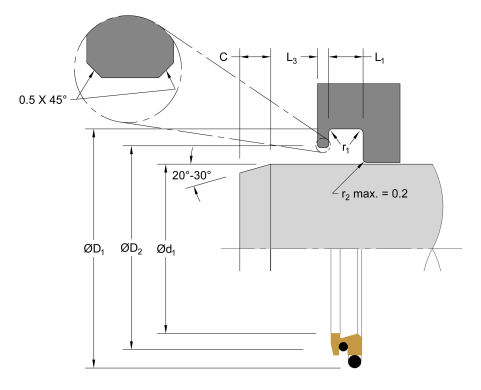Characteristics and performance
The Hallite EXG is a double-acting, two o-ring energized, rod wiper/excluder designed to include two different unique wiping lip geometries. The EXG wiper is primarily designed for environments with heavy contamination, particularly when the rod is facing upwards. The two wiping lips combine to scrape debris from the rod and contain residual oil on rod extension.
Hallite’s innovative Umbrella® wiper technology is designed to eliminate debris build up from in front of the primary wiping lip by forcing it to flow to the outer diameter of the cylinder away from the rod. The EXG design requires two o-ring energizers; one o-ring energizer provides downward force to maintain the engagement of the inner wiping lip, while the other o-ring provides the necessary force and static sealing of the primary wiping lip area to the sliding surface.
Typically made from exclusive Hallite Armorlene® materials. High-performance Armorlene® materials, like HLX, provide outstanding wear and scraping capability as well as large range of temperature and media compatibility. The Halite EXG wiper employs the same basic principles of design function as the Hallite E2W, E5W, and EXF, though the EXG wiper may require a gland drain to properly relieve pressure between the wiper and rod seal.
Product details
Temp range
Max speed
* Max pressure stated is dependant on the material variant selected. Please consult the datasheet for further information.
- Recomended
- Possible
- Not suitable
* For fluid types marked as possible, please call our team of experts on +44 208 941 2244 to talk through your requirements and determine if this seal is the most suitable for your needs.
| Dynamic application | Static application | |
|---|---|---|
| Fluids based on mineral oil | ||
| Any | Recommended | Possible |
| Waterbased fluids | ||
| HFA (5/95) | Possible | Possible |
| HFB (60/40 invert emulsion) | Possible | Possible |
| HFC (water glycol) | Recommended | Possible |
| Water | Possible | Possible |
| Other fluid types | ||
| Air/Nitrogen | Possible | Possible |
| HFD (Phosphate ester ARYL Type) | Not suitable | Not suitable |
| Synthetic esters (HEES, HFDU) | Recommended | Possible |







